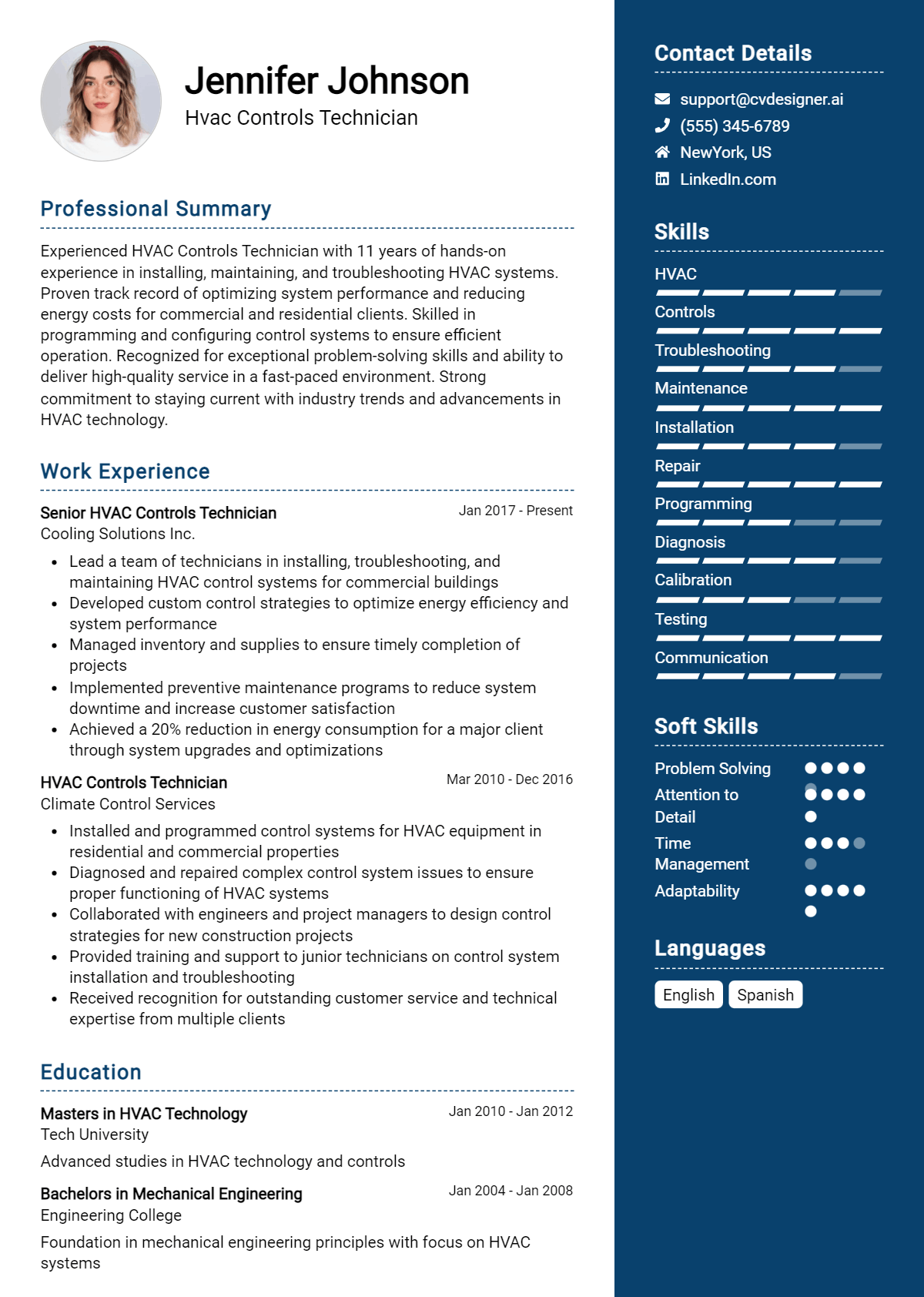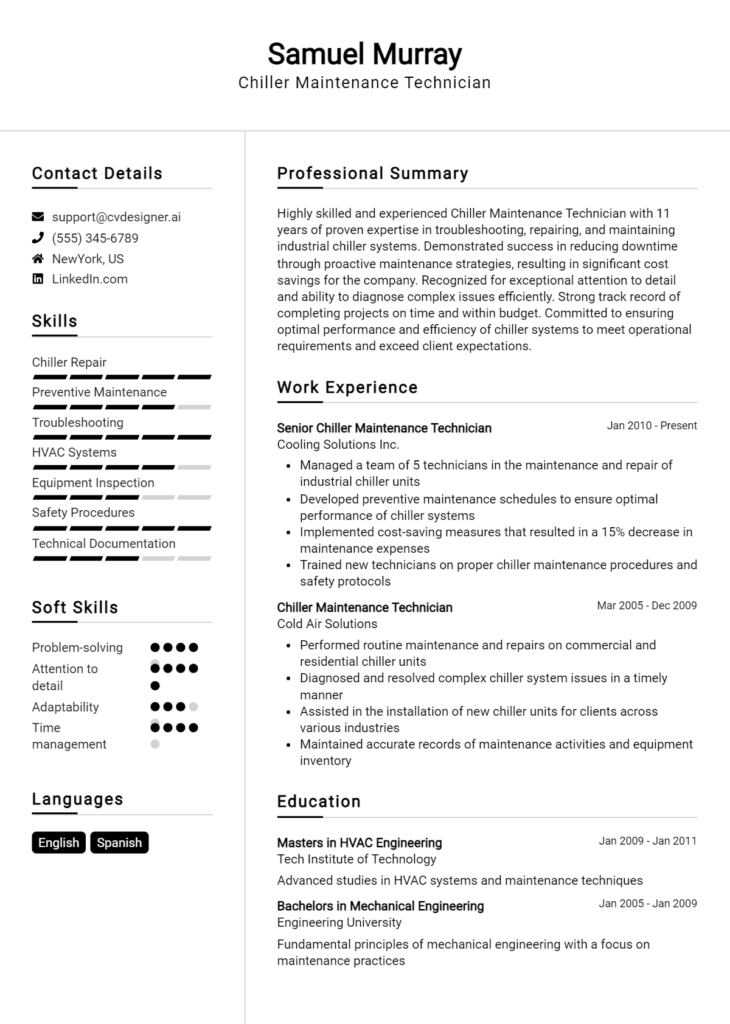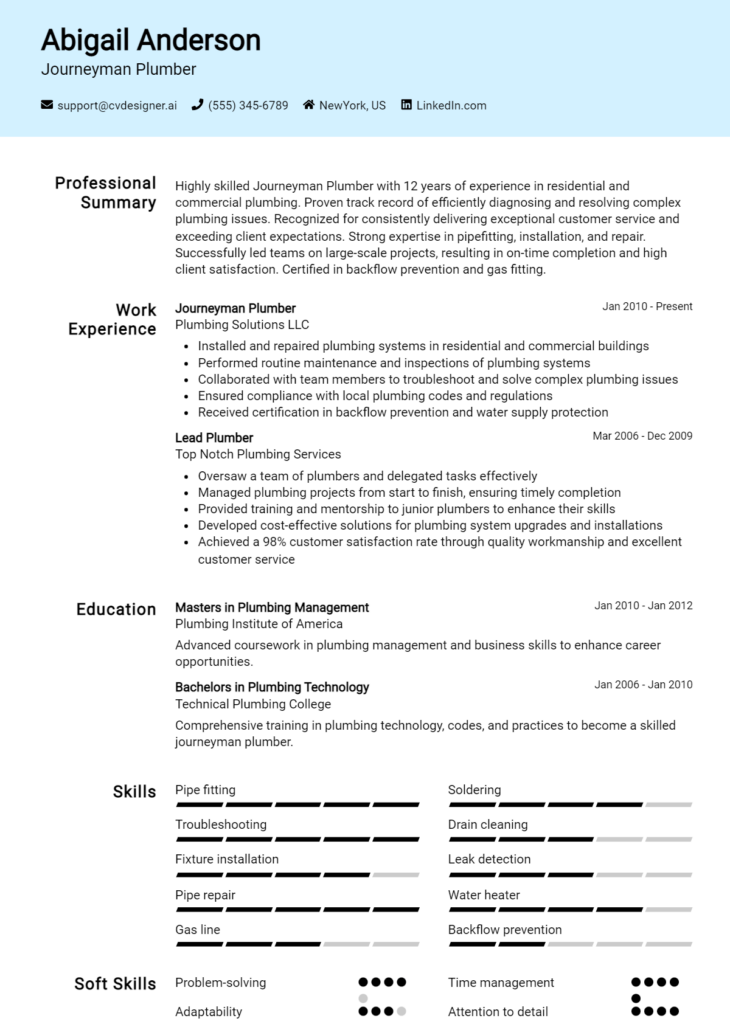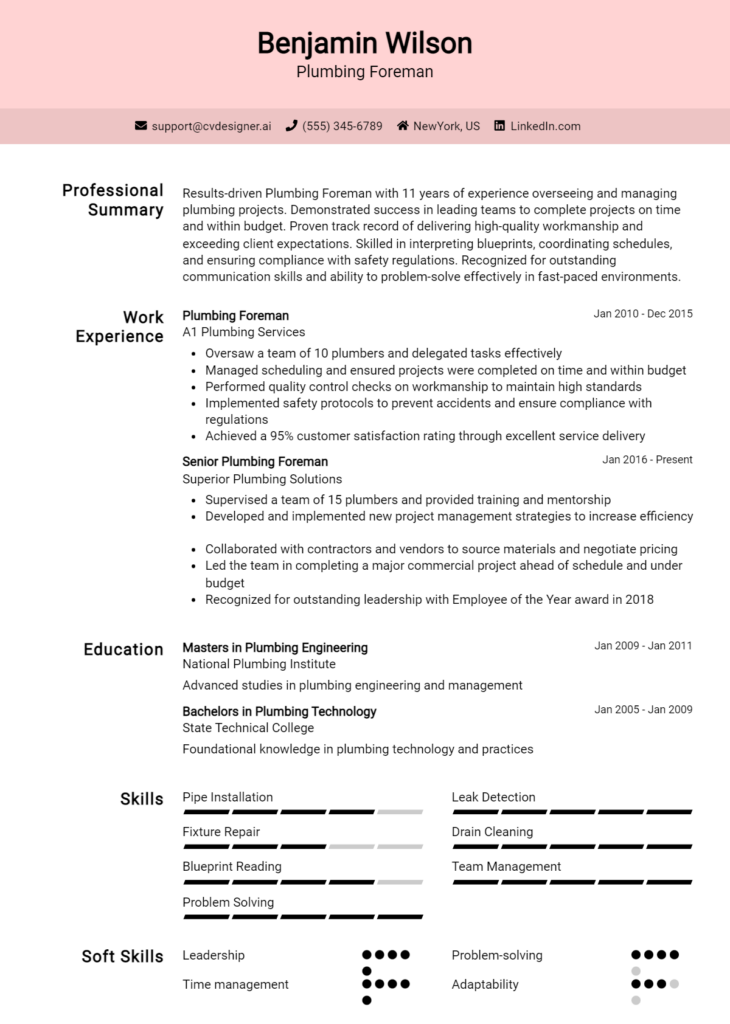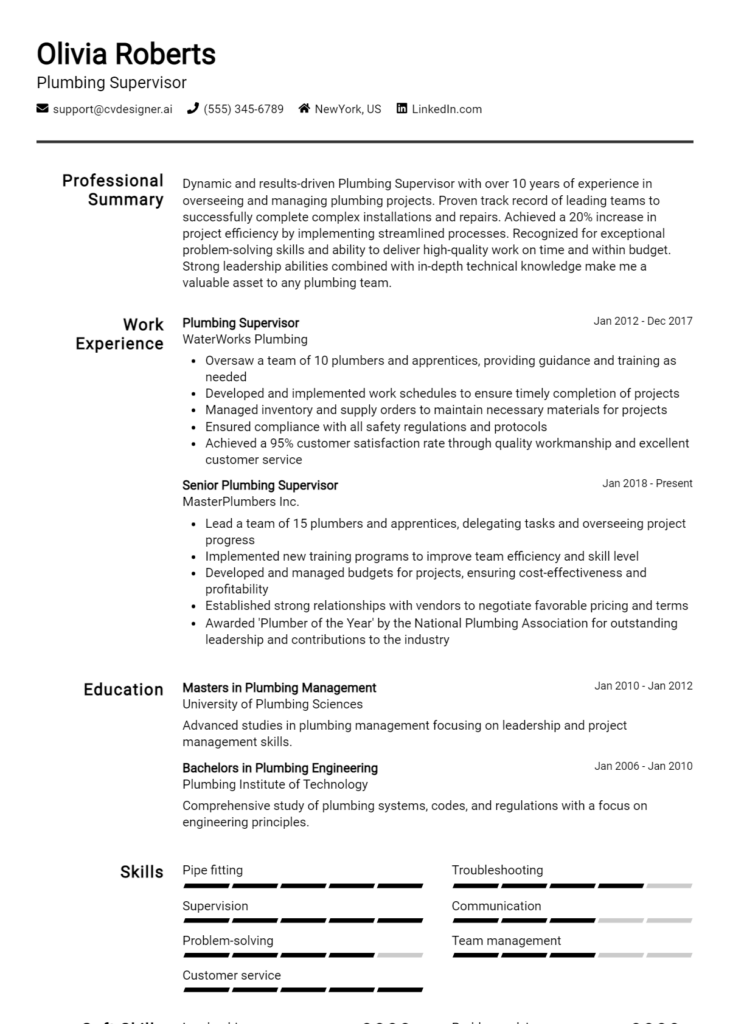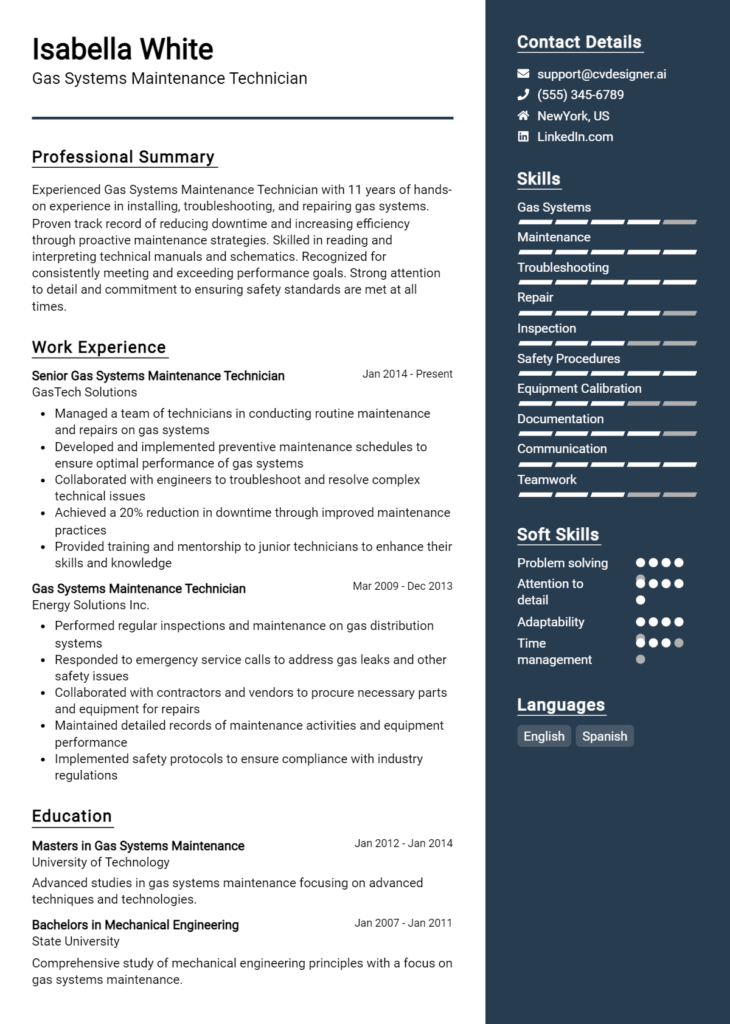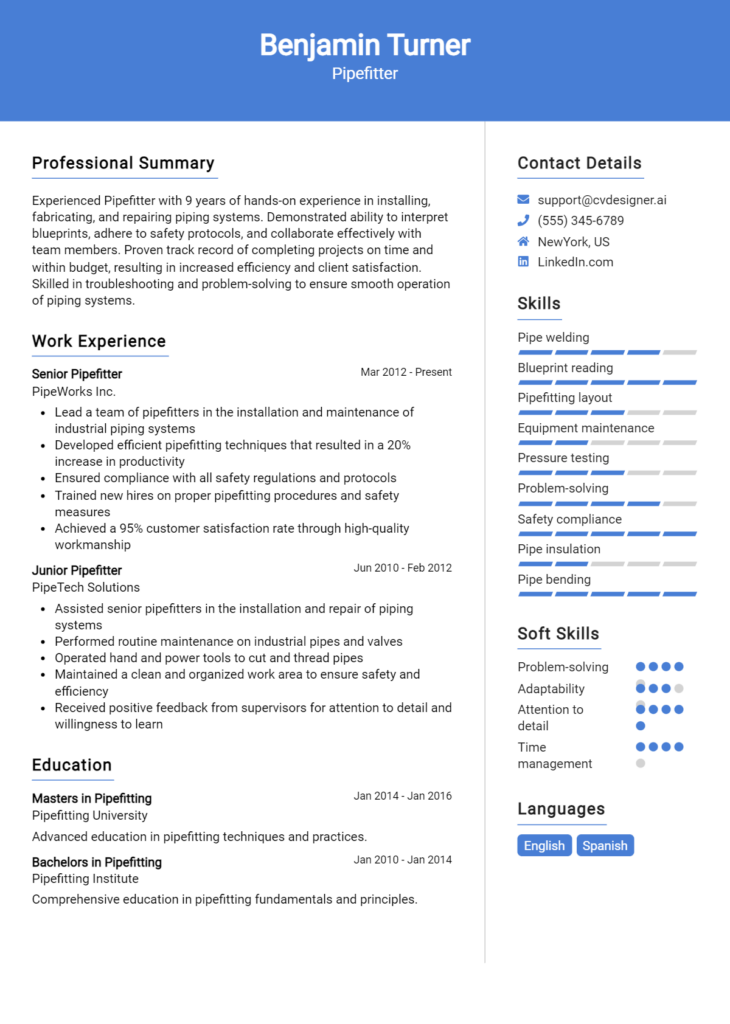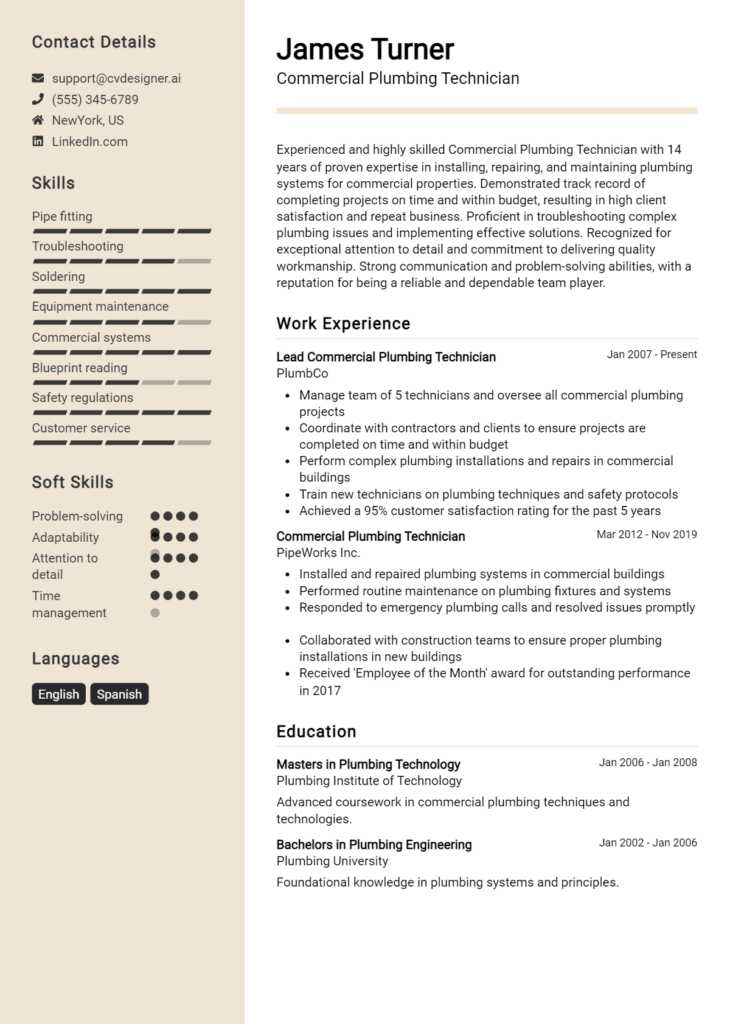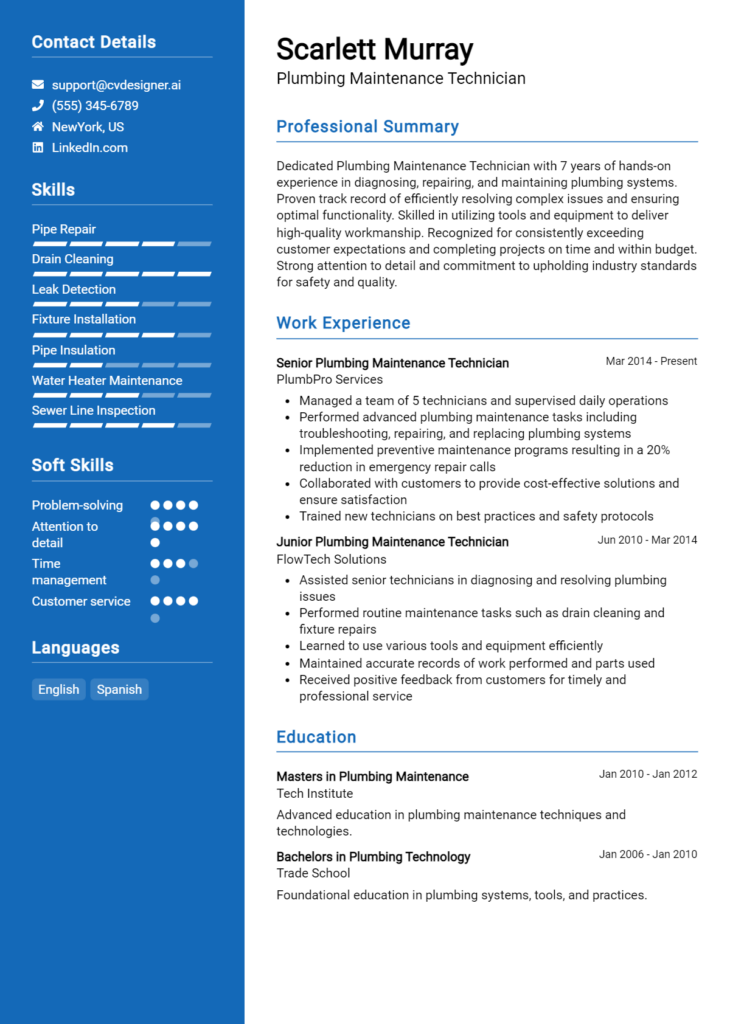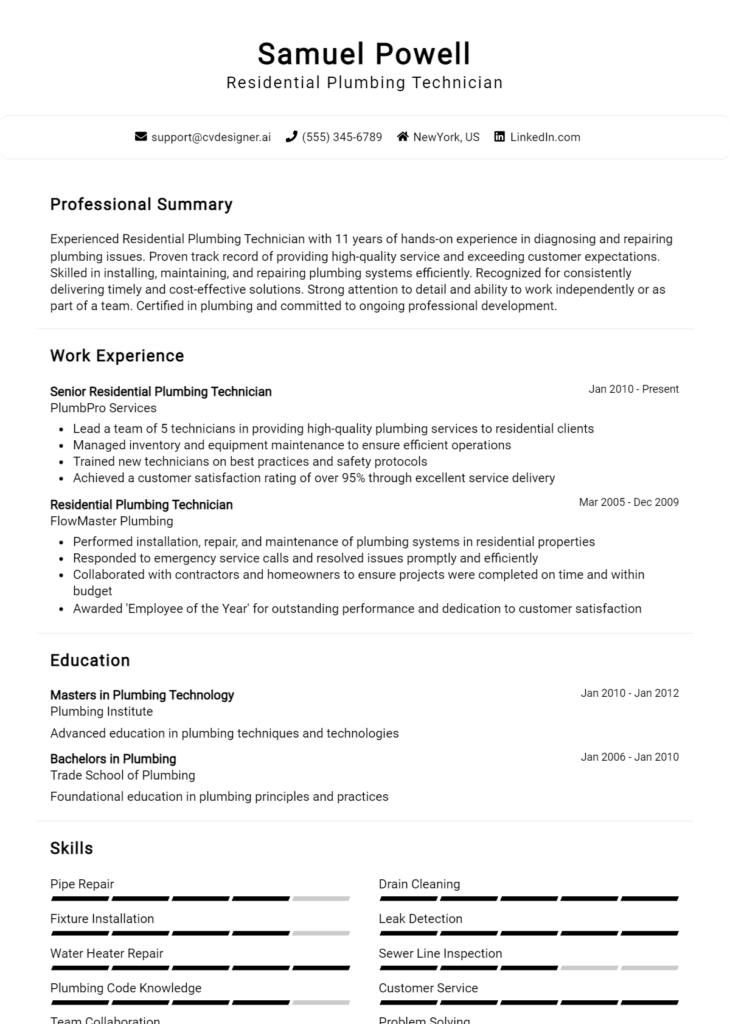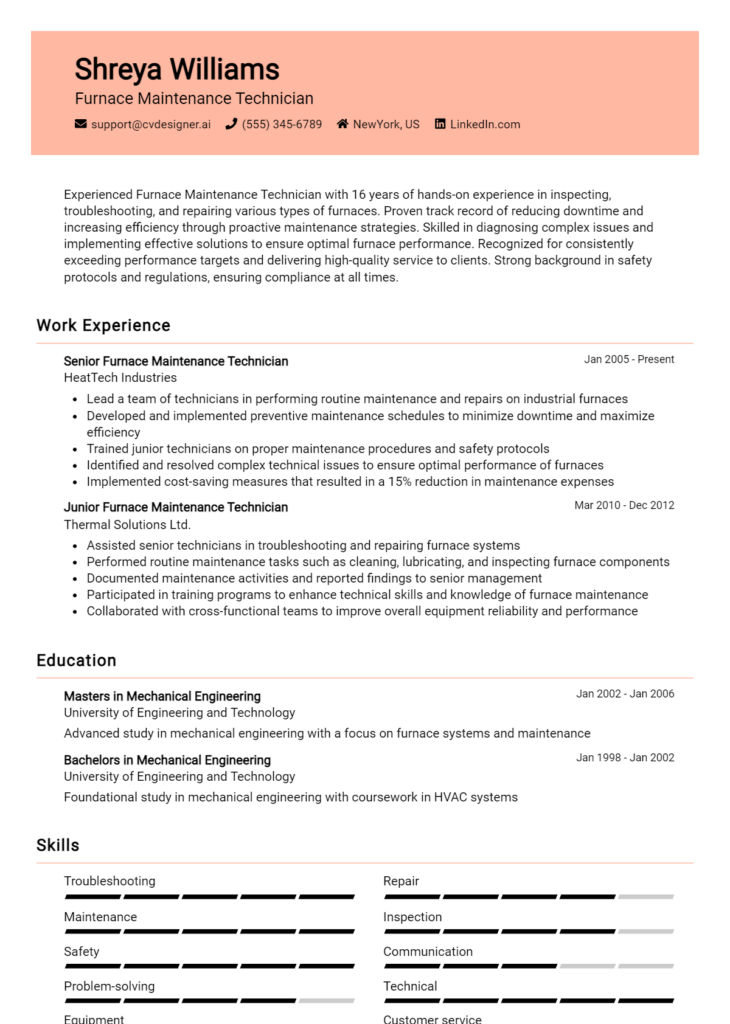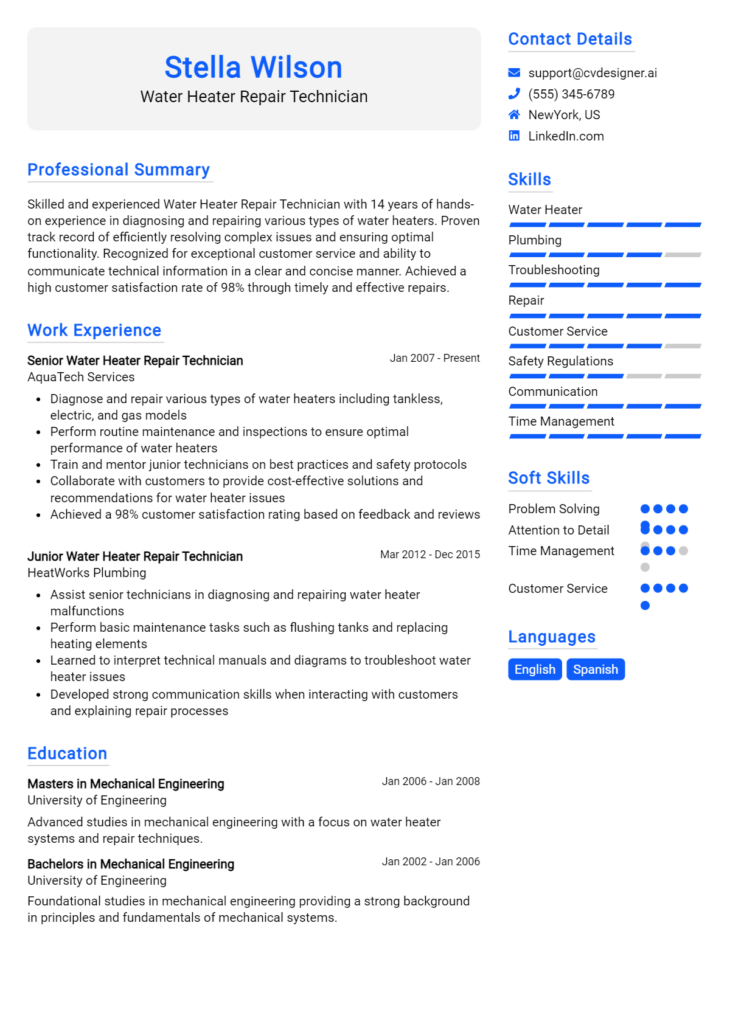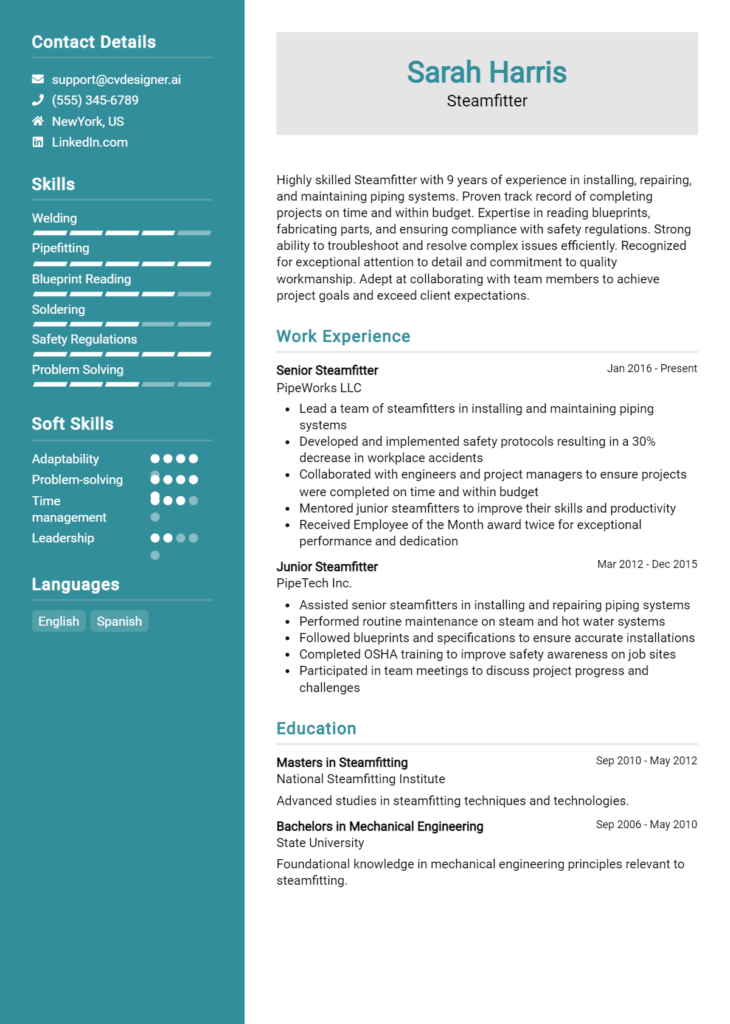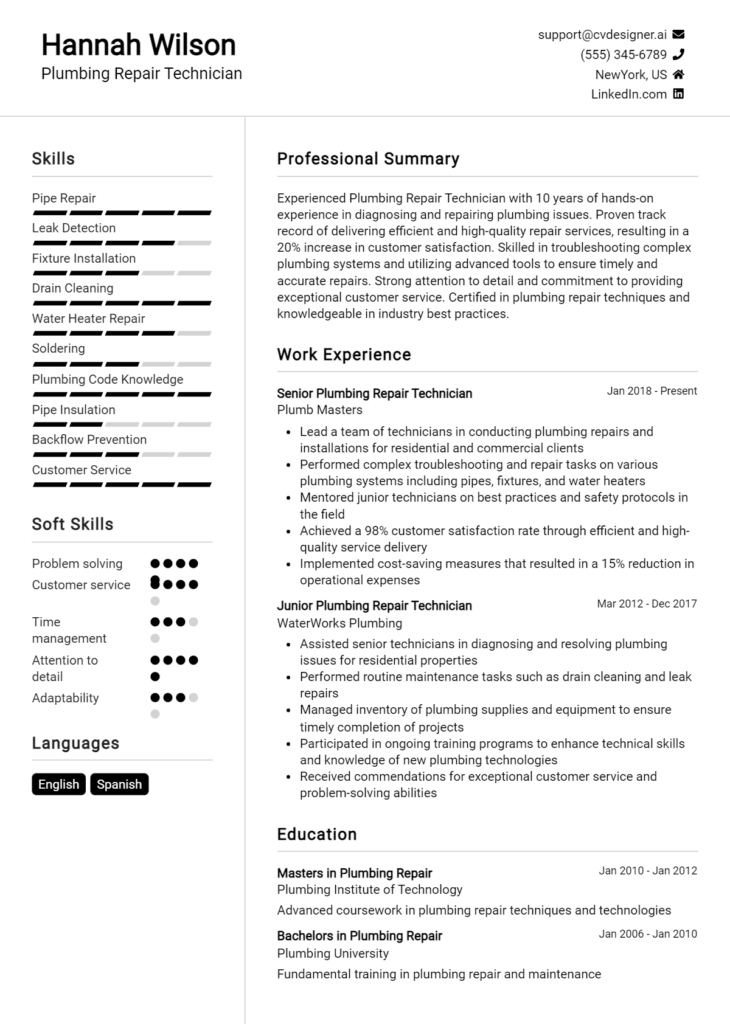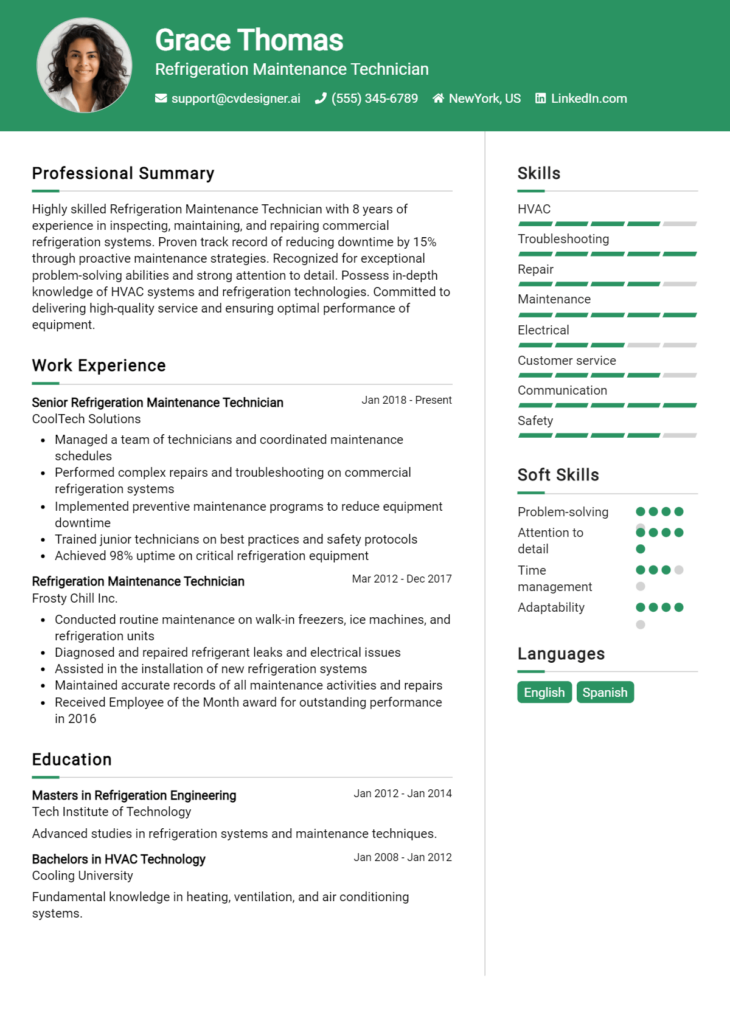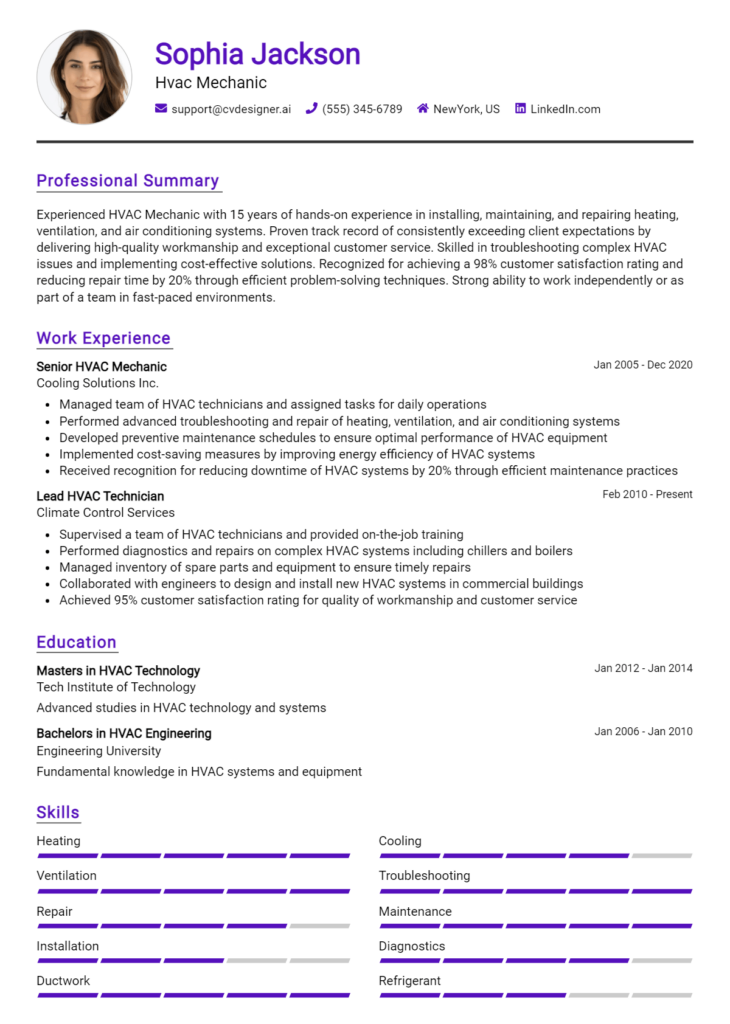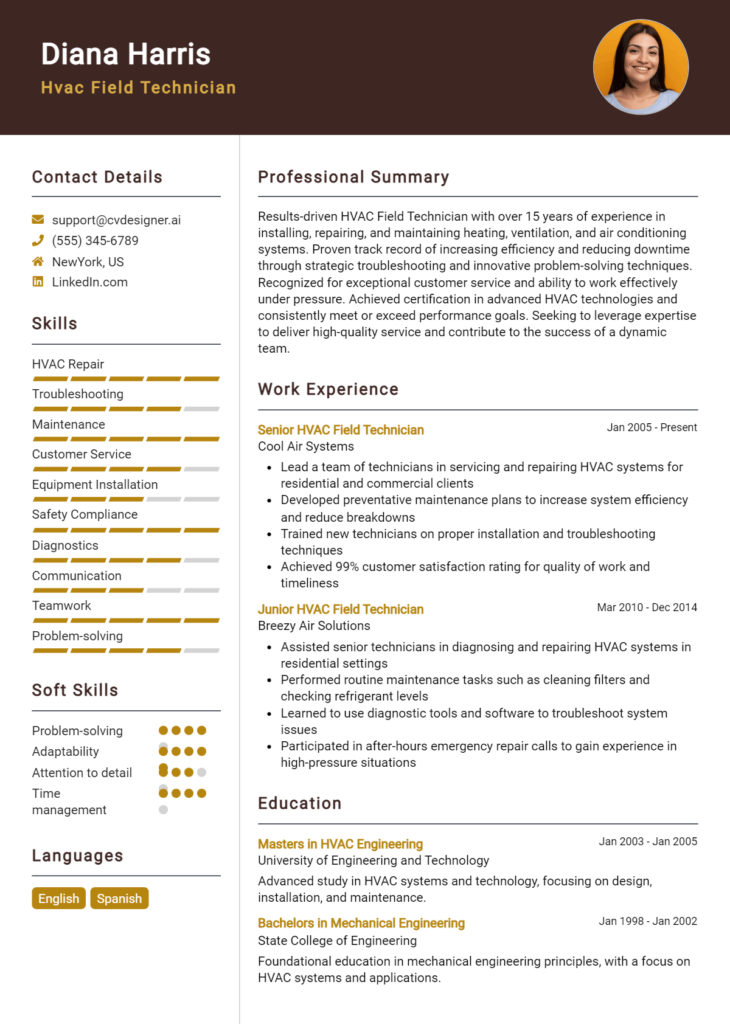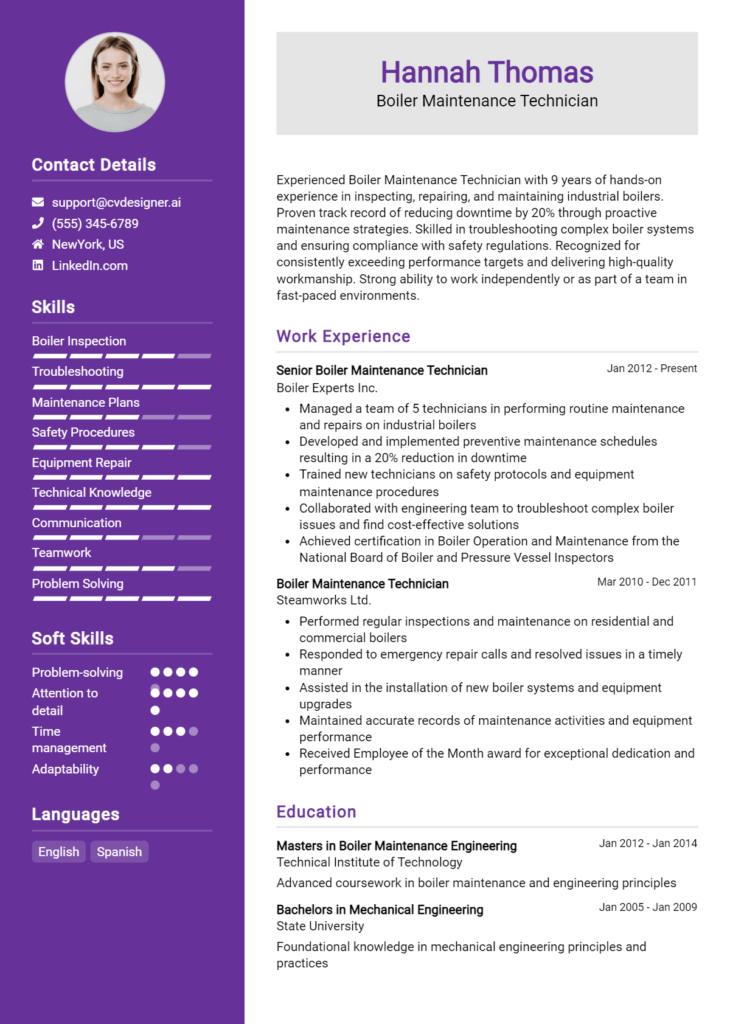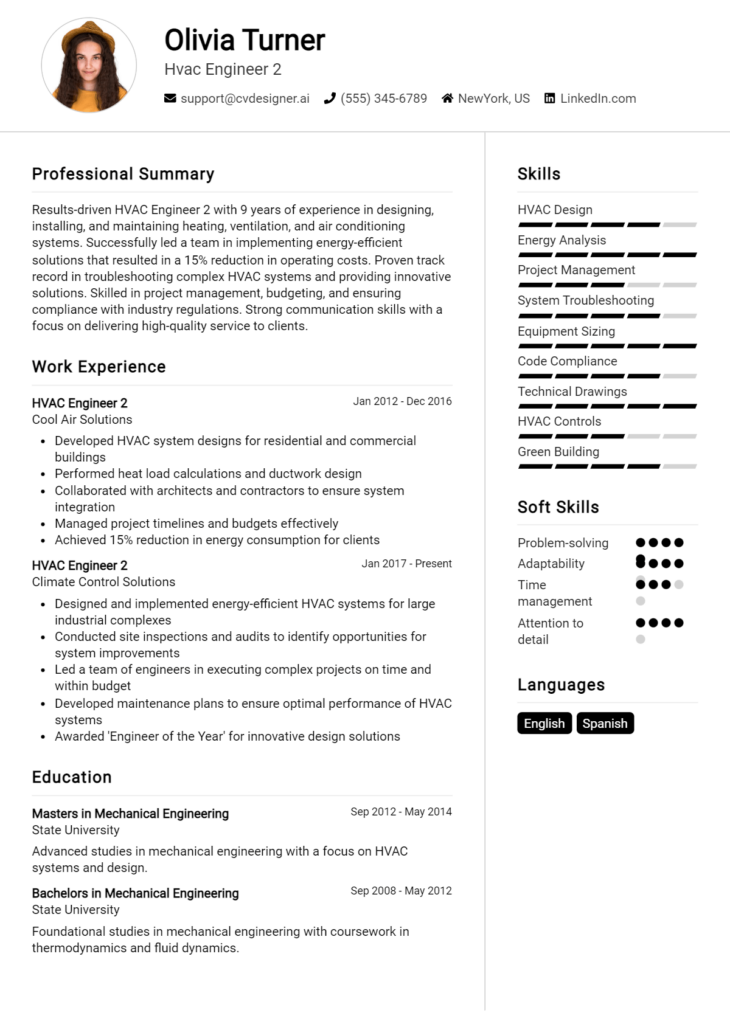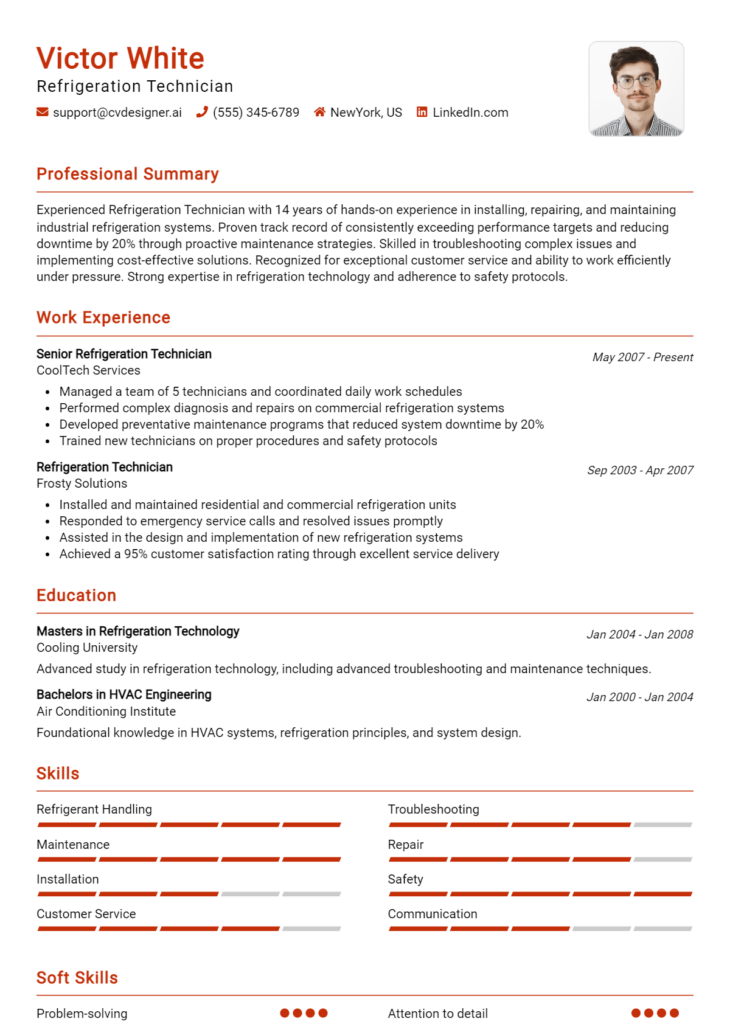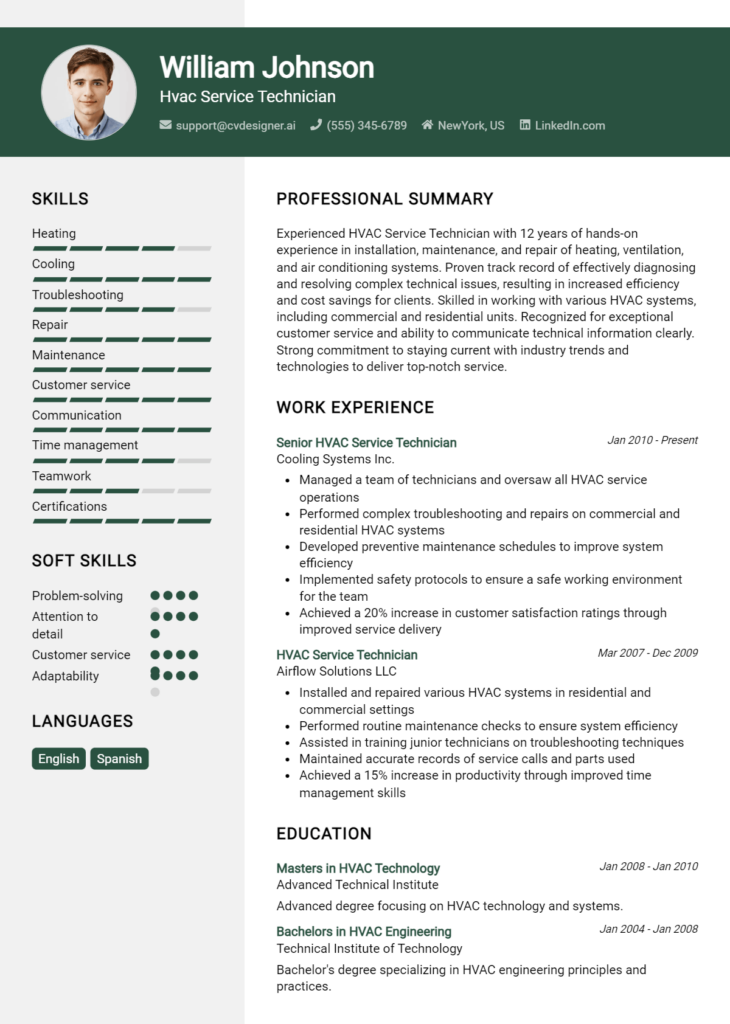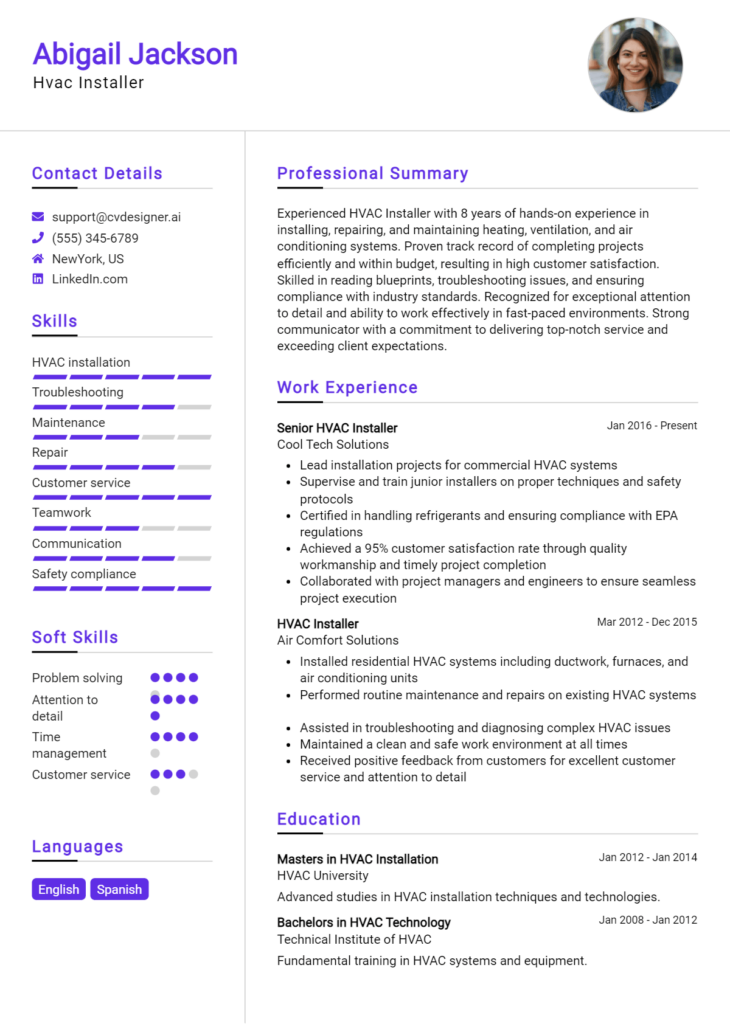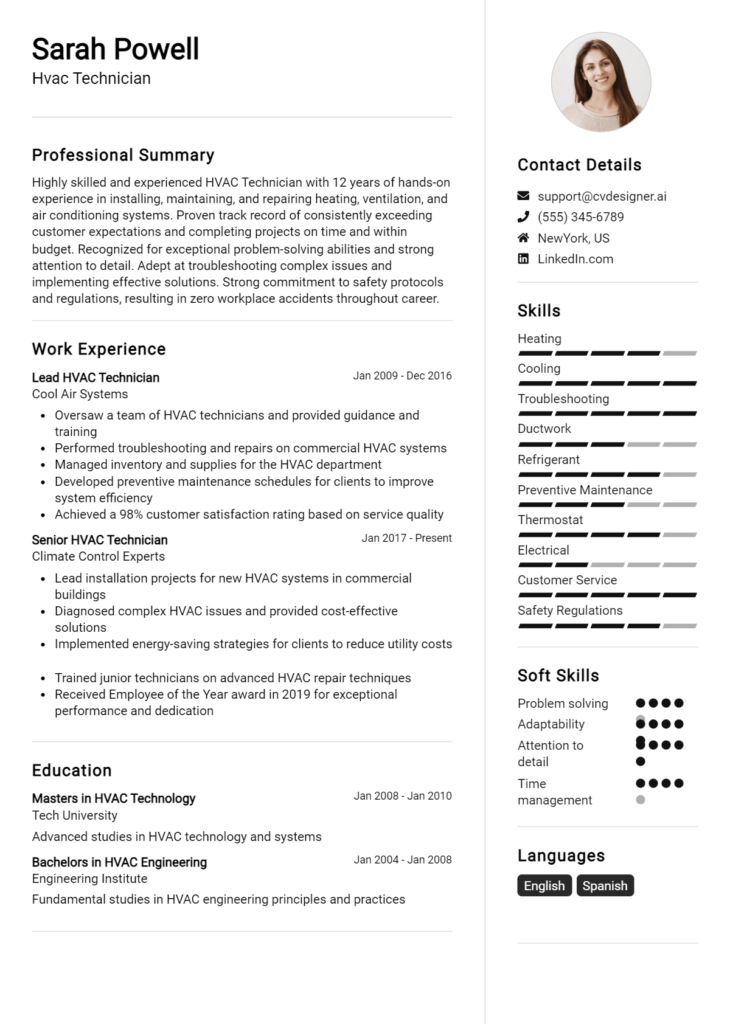HVAC Controls Technician Core Responsibilities
An HVAC Controls Technician plays a crucial role in ensuring effective heating, ventilation, and air conditioning systems. Key responsibilities include installing, calibrating, and maintaining control systems, while troubleshooting and resolving technical issues. This role bridges various departments by collaborating with engineers, contractors, and facility managers, requiring strong technical, operational, and problem-solving skills. These competencies contribute significantly to the organization's efficiency and sustainability goals. A well-structured resume can effectively highlight these qualifications, showcasing the technician's expertise and contributions to potential employers.
Common Responsibilities Listed on HVAC Controls Technician Resume
- Install and configure HVAC control systems and equipment.
- Perform routine maintenance and inspections of HVAC systems.
- Troubleshoot and repair control system malfunctions.
- Calibrate sensors and control devices for optimal performance.
- Document and maintain records of service and repairs.
- Collaborate with engineering teams on system design improvements.
- Provide technical support and training to staff and clients.
- Ensure compliance with safety regulations and industry standards.
- Analyze system performance data to identify efficiency opportunities.
- Manage inventory of parts and tools necessary for repairs.
- Update and implement system programming as needed.
- Assist in project planning and execution for HVAC installations.
High-Level Resume Tips for HVAC Controls Technician Professionals
A well-crafted resume is an essential tool for HVAC Controls Technician professionals, as it serves as the first impression a candidate makes on potential employers. In a competitive job market, a resume needs to effectively showcase both technical skills and relevant achievements to stand out. A compelling resume not only highlights a candidate's qualifications but also illustrates their ability to contribute meaningfully to an organization. This guide will provide practical and actionable resume tips specifically tailored for HVAC Controls Technician professionals, ensuring that they present their best selves to prospective employers.
Top Resume Tips for HVAC Controls Technician Professionals
- Tailor your resume to the specific job description by incorporating keywords and phrases used in the posting.
- Highlight relevant experience in HVAC controls, including specific systems and technologies you have worked with.
- Quantify your achievements by including metrics, such as energy savings or system efficiency improvements, to demonstrate your impact.
- Showcase industry-specific skills, such as familiarity with HVAC control systems, programming languages, and troubleshooting techniques.
- Include certifications and training relevant to HVAC controls, such as NATE, EPA, or manufacturer-specific credentials.
- Use action verbs to describe your responsibilities and accomplishments, making your contributions clear and impactful.
- Incorporate a professional summary at the top of your resume that succinctly outlines your experience and career goals.
- Keep your resume concise, ideally one page, focusing on the most relevant information to capture the employer's attention.
- Proofread thoroughly to eliminate any grammatical errors or typos, as attention to detail is crucial in the HVAC industry.
By implementing these tips, HVAC Controls Technician professionals can significantly enhance their resumes, improving their chances of landing a job in this specialized field. A focused and polished resume will not only highlight their qualifications but also demonstrate their commitment to professionalism and excellence, making them more attractive candidates to prospective employers.
Why Resume Headlines & Titles are Important for HVAC Controls Technician
In the competitive field of HVAC technology, a resume headline or title serves as a powerful first impression that can set the tone for the entire application. For an HVAC Controls Technician, a well-crafted headline can immediately capture the attention of hiring managers by succinctly summarizing key qualifications and areas of expertise. This brief yet impactful phrase should encapsulate the candidate's most relevant skills, experiences, or achievements, making it clear why they are the ideal fit for the position. A strong headline is essential for standing out in a crowded job market, as it is often the first thing potential employers read when reviewing resumes.
Best Practices for Crafting Resume Headlines for HVAC Controls Technician
- Keep it concise: Aim for one succinct phrase that captures your qualifications.
- Be specific: Include relevant skills or certifications that pertain to HVAC controls.
- Highlight achievements: Mention any notable accomplishments to demonstrate your value.
- Use industry-specific language: Incorporate terminology that is familiar to hiring managers in the HVAC field.
- Showcase years of experience: If applicable, include the number of years you have worked in HVAC controls.
- Focus on your unique selling points: What sets you apart from other candidates?
- Align with the job description: Tailor your headline to reflect the requirements and responsibilities of the job you're applying for.
- Avoid clichés: Steer clear of generic phrases that do not add value to your application.
Example Resume Headlines for HVAC Controls Technician
Strong Resume Headlines
"Certified HVAC Controls Technician with 5+ Years of Experience in Energy Management Solutions"
“Expert in HVAC Automation and Controls with Proven Track Record in System Optimization”
“Detail-Oriented HVAC Controls Technician Specializing in Troubleshooting and System Design”
“Dynamic HVAC Controls Specialist with Extensive Knowledge in Building Management Systems”
Weak Resume Headlines
“HVAC Technician Looking for a Job”
“Experienced Worker in the HVAC Field”
The strong headlines are effective because they convey clear, specific information about the candidate's qualifications and expertise, making an immediate impact on the reader. They use industry-relevant terminology and highlight unique strengths, which can resonate with hiring managers. In contrast, the weak headlines fail to impress due to their vagueness and lack of specificity. They do not provide any insight into the candidate's skills or accomplishments, making it difficult for employers to see the value in the applicant.
Writing an Exceptional HVAC Controls Technician Resume Summary
A well-crafted resume summary is essential for an HVAC Controls Technician as it serves as the first impression for hiring managers. This brief introductory paragraph encapsulates key skills, experiences, and accomplishments, providing a snapshot of what the candidate can bring to the role. A strong summary should be concise yet impactful, effectively highlighting relevant qualifications that align with the job description. By capturing attention quickly, it sets the stage for the rest of the resume and increases the chances of securing an interview.
Best Practices for Writing a HVAC Controls Technician Resume Summary
- Quantify Achievements: Use numbers to highlight your impact in previous roles, such as energy savings or system efficiency improvements.
- Focus on Relevant Skills: Emphasize skills that are specifically relevant to HVAC controls, such as programming, troubleshooting, and system diagnostics.
- Tailor for the Job Description: Customize your summary to reflect the specific requirements and duties outlined in the job posting.
- Use Industry Language: Incorporate terminology and jargon that is familiar in the HVAC industry to demonstrate your expertise.
- Highlight Certifications: Mention any relevant certifications or licenses that enhance your credibility as a technician.
- Keep it Concise: Limit your summary to 3-5 sentences to maintain clarity and focus.
- Showcase Soft Skills: Include interpersonal skills like teamwork and communication, which are essential for working with clients and colleagues.
- Maintain Professional Tone: Use a formal yet engaging tone to reflect professionalism in the summary.
Example HVAC Controls Technician Resume Summaries
Strong Resume Summaries
Detail-oriented HVAC Controls Technician with over 7 years of experience in optimizing building automation systems, achieving an average of 20% energy reduction across multiple client projects. Proficient in programming and troubleshooting HVAC controls, with a proven track record of enhancing system reliability and performance.
Results-driven HVAC Controls Technician skilled in the installation and maintenance of advanced control systems. Successfully reduced operational costs by 15% for a major commercial client through effective diagnostics and system upgrades. Holds multiple certifications in HVAC technology and building automation.
Experienced HVAC Controls Technician with a solid background in retrofitting and optimizing existing systems. Spearheaded a project that improved system efficiency by 30%, contributing to significant energy cost savings. Committed to delivering exceptional service while maintaining compliance with industry standards.
Weak Resume Summaries
HVAC technician with experience in controls and maintenance. I am looking for a new position with a growing company.
Dedicated professional seeking to leverage skills in HVAC systems. I have worked in various roles but am open to exploring new opportunities.
The strong resume summaries stand out because they include quantifiable results, specific skills, and relevant achievements that directly relate to the HVAC Controls Technician role. They showcase the candidate's expertise and commitment to efficiency and improvement. In contrast, the weak summaries are vague and lack specificity, failing to engage hiring managers or convey the candidate's true potential in the HVAC field.
Work Experience Section for HVAC Controls Technician Resume
The work experience section of an HVAC Controls Technician resume is crucial for demonstrating the candidate's practical knowledge and technical skills in the field. This section highlights not only their proficiency in managing HVAC control systems but also their ability to lead teams and deliver high-quality results. By quantifying achievements and aligning experiences with industry standards, candidates can effectively showcase their value to potential employers, presenting a compelling narrative of their professional journey and contributions to previous projects.
Best Practices for HVAC Controls Technician Work Experience
- Highlight relevant technical skills, such as programming, troubleshooting, and system integration.
- Quantify achievements by including specific metrics, such as reduced energy consumption or improved system efficiency.
- Use action verbs to convey a sense of leadership and initiative in past roles.
- Focus on teamwork and collaboration, illustrating how you worked effectively with other professionals.
- Align your experience with industry standards and best practices for HVAC systems.
- Include certifications and training that enhance your credibility and technical knowledge.
- Tailor your experience to match the job description of the position you are applying for.
- Demonstrate problem-solving skills by providing examples of challenges faced and how you overcame them.
Example Work Experiences for HVAC Controls Technician
Strong Experiences
- Led a team in the redesign of an HVAC control system, resulting in a 20% reduction in energy costs for a commercial building.
- Successfully programmed and implemented advanced building automation systems for over 50 client sites, improving operational efficiency by 30%.
- Collaborated with engineers to develop a predictive maintenance program that decreased system downtime by 15%.
- Trained and mentored junior technicians, enhancing team productivity and reducing error rates by 25%.
Weak Experiences
- Worked on HVAC systems for various projects.
- Assisted with some troubleshooting of HVAC controls.
- Helped implement system upgrades without specific details.
- Performed routine maintenance on HVAC equipment.
The examples listed as strong experiences reflect specific achievements, measurable outcomes, and a clear demonstration of leadership and collaboration, which are essential in the HVAC Controls Technician role. In contrast, the weak experiences lack detail and quantifiable results, making them less impactful and failing to showcase the candidate's true potential and technical expertise.
Education and Certifications Section for HVAC Controls Technician Resume
The education and certifications section of an HVAC Controls Technician resume plays a crucial role in showcasing the candidate's academic background and professional qualifications. This section not only highlights relevant degrees and industry-recognized certifications but also demonstrates the candidate's commitment to continuous learning and staying updated with the latest technologies and practices in HVAC controls. By providing detailed information on relevant coursework, certifications, and specialized training, candidates can significantly enhance their credibility and align themselves with the specific requirements of the job role they are applying for.
Best Practices for HVAC Controls Technician Education and Certifications
- Include only relevant degrees and certifications that pertain to HVAC controls and related fields.
- List certifications in order of relevance, prioritizing those that are widely recognized in the industry.
- Provide specific details about coursework that covers key topics such as control systems, automation, and energy management.
- Highlight any specialized training or workshops that demonstrate advanced skills or knowledge in HVAC technologies.
- Ensure that all listed credentials are current, and include renewal dates if applicable.
- Use clear and concise language to describe the significance of each certification or degree.
- Consider including a brief description of hands-on projects or practical applications from training programs.
- Tailor the education and certifications section to match the specific requirements of the job description.
Example Education and Certifications for HVAC Controls Technician
Strong Examples
- Bachelor of Science in Mechanical Engineering, XYZ University (Graduated 2020)
- NCCER HVAC Controls Technician Certification (Issued 2022)
- LEED Green Associate Certification (Issued 2021)
- Advanced Control Systems Training, ABC Institute (Completed 2023)
Weak Examples
- Associate Degree in Liberal Arts, Some Community College (Graduated 2018)
- Basic Electrical Certification (Issued 2015)
- High School Diploma (Graduated 2010)
- Old HVAC Technician Certification (Expired 2019)
The strong examples listed above are considered relevant and impactful because they directly pertain to the HVAC Controls Technician role, showcasing both academic and industry-recognized credentials that demonstrate the candidate's expertise. In contrast, the weak examples lack relevance to the HVAC field, either due to being outdated, too general, or not aligning with the specific skills required for the position. By focusing on strong, relevant qualifications, candidates can effectively position themselves as suitable applicants for HVAC controls technician roles.
Top Skills & Keywords for HVAC Controls Technician Resume
As an HVAC Controls Technician, possessing a well-rounded skill set is crucial for not only securing a job but also excelling in the role. Employers seek candidates who can demonstrate technical proficiency, problem-solving abilities, and effective communication skills. A strong resume that highlights both hard and soft skills can significantly enhance your chances of landing an interview. By showcasing your expertise in HVAC systems, controls, and troubleshooting, along with interpersonal qualities like teamwork and adaptability, you can present yourself as a well-equipped candidate ready to tackle the challenges of the job.
Top Hard & Soft Skills for HVAC Controls Technician
Soft Skills
- Communication
- Problem-solving
- Teamwork
- Adaptability
- Time management
- Customer service
- Attention to detail
- Critical thinking
- Initiative
- Dependability
- Conflict resolution
- Interpersonal skills
- Organization
- Flexibility
- Leadership
Hard Skills
- HVAC system design
- Control systems programming
- Troubleshooting and diagnostics
- Electrical and electronic systems
- Refrigeration principles
- Building automation systems (BAS)
- HVAC system installation
- Preventive maintenance
- Data analysis and reporting
- Knowledge of local codes and regulations
- Fluid dynamics
- Energy efficiency practices
- Use of diagnostic tools and equipment
- Wiring and circuitry
- Blueprint reading
- Software proficiency (e.g., HVAC software, Microsoft Office)
- System calibration
By focusing on these essential skills and showcasing relevant work experience, you can create a compelling resume that stands out to potential employers in the HVAC industry.
Stand Out with a Winning HVAC Controls Technician Cover Letter
Dear Hiring Manager,
I am writing to express my interest in the HVAC Controls Technician position at [Company Name] as advertised on [Job Board/Company Website]. With a solid background in HVAC systems and controls, coupled with my hands-on experience in troubleshooting, installation, and repair, I am excited about the opportunity to contribute to your team. My technical expertise, combined with my commitment to ensuring optimal system performance and energy efficiency, makes me an ideal candidate for this role.
In my previous position at [Previous Company Name], I successfully managed the installation and maintenance of HVAC control systems in both residential and commercial settings. I have a keen understanding of various control protocols, including BACnet and Modbus, which has enabled me to effectively integrate and optimize HVAC systems for improved energy performance. Additionally, my ability to read and interpret blueprints and technical diagrams has allowed me to identify issues swiftly and implement successful solutions, reducing downtime and enhancing customer satisfaction.
Collaboration is key in the HVAC industry, and I pride myself on my ability to work effectively with cross-functional teams, including engineers, project managers, and other technicians. I am committed to staying current with industry trends and technological advancements, ensuring that I bring the most effective solutions to the table. My strong communication skills enable me to explain complex technical concepts in a way that is easily understood by clients and colleagues alike, fostering a productive and cooperative work environment.
I am enthusiastic about the opportunity to join [Company Name] and contribute to the continued success of your HVAC projects. Thank you for considering my application. I look forward to the possibility of discussing how my experience and skills align with your needs.
Sincerely,
[Your Name]
[Your Phone Number]
[Your Email Address]
Common Mistakes to Avoid in a HVAC Controls Technician Resume
When crafting a resume for the role of an HVAC Controls Technician, it's crucial to present your skills and experiences effectively to stand out in a competitive job market. However, many candidates make common mistakes that can hinder their chances of landing an interview. Understanding these pitfalls can help you create a more compelling resume that accurately reflects your qualifications and aligns with the expectations of potential employers.
Neglecting to Customize the Resume: Submitting a generic resume without tailoring it to the specific job description can lead to missed opportunities. Employers appreciate candidates who demonstrate an understanding of their needs.
Omitting Relevant Certifications: Failing to highlight industry-specific certifications, such as those from NATE or EPA, can leave hiring managers questioning your qualifications and technical expertise.
Using Jargon Without Explanation: While technical terms are important, using too much jargon without context can confuse readers. Be sure to explain relevant terms or concepts clearly to showcase your knowledge.
Listing Duties Instead of Achievements: Merely listing job responsibilities can make your resume bland. Instead, focus on your achievements and quantify them with data to demonstrate your impact in previous roles.
Ignoring Soft Skills: Technical skills are vital, but neglecting to mention soft skills, such as teamwork, communication, and problem-solving abilities, can create an incomplete picture of your capabilities.
Poor Formatting and Spelling Errors: A cluttered format or spelling mistakes can detract from your professionalism. Ensure your resume is well-organized and free of errors to make a strong first impression.
Failing to Include Relevant Experience: Omitting internships, volunteer work, or relevant projects can undervalue your practical experience. Always include any hands-on experience that showcases your skills.
Overloading with Information: Including too much information can overwhelm the reader. Aim for a concise resume that highlights key qualifications and experiences, keeping it to one or two pages.
Conclusion
As we wrap up our discussion on the vital role of an HVAC Controls Technician, let's recap the essential skills and responsibilities that define this position. HVAC Controls Technicians are crucial in ensuring efficient heating, ventilation, and air conditioning systems. Their expertise ranges from installing and maintaining complex control systems to troubleshooting issues and optimizing system performance. Proficiency in programming, knowledge of electrical systems, and a solid understanding of HVAC principles are key attributes for success in this field.
To thrive as an HVAC Controls Technician, it's essential to stay updated with the latest technologies and industry standards. Continuous learning and hands-on experience will enhance your capabilities and make you a more competitive candidate in the job market.
Now, it's time to take the next step in your career. Review your HVAC Controls Technician resume to ensure it reflects your skills, experiences, and accomplishments effectively. Utilize available resources to enhance your application materials. Check out resume templates, use the resume builder for a polished look, explore resume examples for inspiration, and craft a compelling introduction with cover letter templates.
Take action today to elevate your resume and increase your chances of landing that ideal HVAC Controls Technician position!

